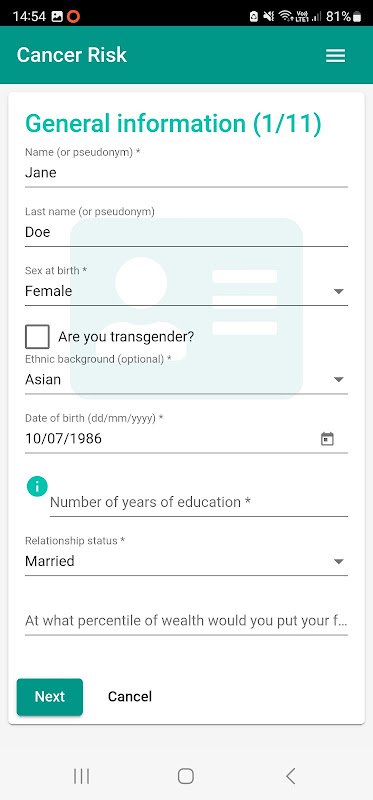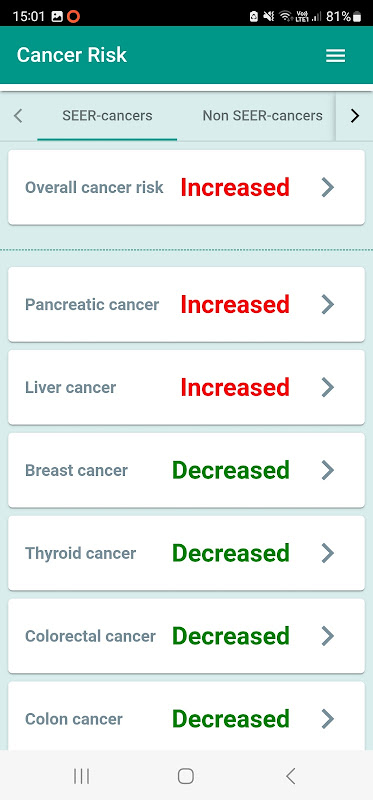This application estimates your general risk of cancer, as well as the risk of 38 types of different cancers, based on roughly 650 different risk factors described in the scientific literature. Results are displayed for lifetime risk as well as for 10-, 20- and 30-year timeframes, as well as the risk of death from the cancer in question. A subdivision in anatomical or pathological subtypes is provided if possible. Detailed references are provided for the impact of each risk factor.
Additionally, over 90 published & validated cancer models have been included in the application, providing more detail for interested users.
This application has the CE conformity mark as a medical device with a low risk. As such, we have followed the Class I conformity assessment procedures as described in Annex VII Module A, EC Declaration of Conformity. As it it is considered a medical device that poses minimal risk to patients and consumers, it falls under the FDA exercise enforcement discretions. For more information, please visit the relevant section the official FDA website: https://www.fda.gov/medical-devices/mobile-medical-applications/examples-mobile-apps-which-fda-will-exercise-enforcement-discretion
To use this application, create an account and enter the requested information in the different tabs as accurately and completely as you can. All information that is requested will influence your risk for at least one type of cancer, so the more complete and accurate the information you enter, the more dependable the results. Age, gender and racial background are critical, all other information is optional. The results will appear after you have completed the last tab and can always be revisited by tapping your name. You can also edit the information you submitted to see how this influences your results.
The lifetime probabilities of developing cancers were based on USA data from the National Cancer Institute's (NCI's) Surveillance, Epidemiology, and End Results (SEER) Program, collected since 1973 and by the Centers for Disease Control and Prevention's (CDC's) National Program of Cancer Registries (NPCR), collected since 1995. These figures were adapted by the hazard ratios available in the published peer-reviewed literature. Only risk factors with a quantifiable risk were included. Risk factors requiring complex tests not available to the average clinician were excluded. Meta-analyses were given preference when available.
DISCLAIMER: This application is strictly educational and all information contained herein cannot and should not replace assessment by a physician. The evaluations presented represent our best efforts to conveniently assess cancer risk. However, as significant controversy and widely different study results can persist around the impact of even a single variable in a strictly selected population, this is based on a large number of assumptions, extrapolations and estimates. As not every study includes a multivariate analysis and the effect of some risk factors on certain cancers is so large their effect cannot be eliminated from basic probability, a bias toward overestimation of risk is possible. Furthermore, there is continuous progress in the scientific literature. Any figures should therefore be regarded as indicative, but not precise.
Any information you enter into this application will only be stored on your device and will never be sent to us or to any other party, for any reason.
All research and medical support for this application was done by Dr. Philippe Westerlinck, radiation oncologist and clinical chair at the University Hospital of Liège, superspecialising in gastro-intestinal, lung and breast cancers.
The Cancer Risk Calculator is a valuable tool that empowers individuals to estimate their risk of developing various types of cancer. It considers a comprehensive range of factors that influence cancer susceptibility, providing personalized insights that can guide preventive measures and healthcare decisions.
Factors Considered
The calculator takes into account a wide array of factors, including:
* Age: Cancer risk generally increases with age.
* Gender: Certain cancers are more prevalent in specific genders.
* Family history: Inherited genetic mutations can significantly elevate cancer risk.
* Lifestyle: Smoking, excessive alcohol consumption, and unhealthy diet are major risk factors.
* Environmental exposures: Exposure to toxins, radiation, and air pollution can contribute to cancer development.
* Medical history: Pre-existing conditions, such as certain infections, can increase susceptibility to certain cancers.
How to Use the Calculator
Using the Cancer Risk Calculator is straightforward. Individuals simply input their personal information and lifestyle habits into the online or mobile app version of the tool. The calculator then generates a personalized risk assessment for several types of cancer, including breast, prostate, lung, and colorectal cancer.
Interpreting the Results
The results of the Cancer Risk Calculator should be interpreted with caution. They provide an estimate of an individual's risk, but do not guarantee a diagnosis or predict the exact time of cancer development.
High-Risk Individuals
Individuals with a high-risk assessment should consider:
* Consulting a healthcare professional: A doctor can discuss the results, provide additional screening recommendations, and recommend lifestyle modifications to reduce risk.
* Adopting preventive measures: These may include regular screenings, lifestyle changes, and genetic testing for inherited mutations.
* Participating in research studies: Clinical trials can provide access to innovative treatments and further insights into cancer prevention.
Low-Risk Individuals
Individuals with a low-risk assessment should:
* Maintain a healthy lifestyle: Focus on regular exercise, a balanced diet, and avoiding tobacco and excessive alcohol.
* Get regular screenings: Follow recommended screening guidelines for early detection of cancer.
* Be aware of family history: Monitor for any changes in family members' cancer status and discuss with a doctor if concerns arise.
Limitations
It's important to note that the Cancer Risk Calculator has limitations. It does not account for all factors that may influence cancer risk, and it cannot predict cancer development with certainty. Additionally, the accuracy of the results depends on the honesty and accuracy of the information provided by the user.
Conclusion
The Cancer Risk Calculator is a valuable tool that provides individuals with an estimate of their personal cancer risk. While it does not provide a definitive diagnosis or predict the exact time of cancer development, it can raise awareness, encourage preventive measures, and guide healthcare decisions. By understanding their risk factors, individuals can take proactive steps to reduce their risk of developing cancer and improve their overall health and well-being.
This application estimates your general risk of cancer, as well as the risk of 38 types of different cancers, based on roughly 650 different risk factors described in the scientific literature. Results are displayed for lifetime risk as well as for 10-, 20- and 30-year timeframes, as well as the risk of death from the cancer in question. A subdivision in anatomical or pathological subtypes is provided if possible. Detailed references are provided for the impact of each risk factor.
Additionally, over 90 published & validated cancer models have been included in the application, providing more detail for interested users.
This application has the CE conformity mark as a medical device with a low risk. As such, we have followed the Class I conformity assessment procedures as described in Annex VII Module A, EC Declaration of Conformity. As it it is considered a medical device that poses minimal risk to patients and consumers, it falls under the FDA exercise enforcement discretions. For more information, please visit the relevant section the official FDA website: https://www.fda.gov/medical-devices/mobile-medical-applications/examples-mobile-apps-which-fda-will-exercise-enforcement-discretion
To use this application, create an account and enter the requested information in the different tabs as accurately and completely as you can. All information that is requested will influence your risk for at least one type of cancer, so the more complete and accurate the information you enter, the more dependable the results. Age, gender and racial background are critical, all other information is optional. The results will appear after you have completed the last tab and can always be revisited by tapping your name. You can also edit the information you submitted to see how this influences your results.
The lifetime probabilities of developing cancers were based on USA data from the National Cancer Institute's (NCI's) Surveillance, Epidemiology, and End Results (SEER) Program, collected since 1973 and by the Centers for Disease Control and Prevention's (CDC's) National Program of Cancer Registries (NPCR), collected since 1995. These figures were adapted by the hazard ratios available in the published peer-reviewed literature. Only risk factors with a quantifiable risk were included. Risk factors requiring complex tests not available to the average clinician were excluded. Meta-analyses were given preference when available.
DISCLAIMER: This application is strictly educational and all information contained herein cannot and should not replace assessment by a physician. The evaluations presented represent our best efforts to conveniently assess cancer risk. However, as significant controversy and widely different study results can persist around the impact of even a single variable in a strictly selected population, this is based on a large number of assumptions, extrapolations and estimates. As not every study includes a multivariate analysis and the effect of some risk factors on certain cancers is so large their effect cannot be eliminated from basic probability, a bias toward overestimation of risk is possible. Furthermore, there is continuous progress in the scientific literature. Any figures should therefore be regarded as indicative, but not precise.
Any information you enter into this application will only be stored on your device and will never be sent to us or to any other party, for any reason.
All research and medical support for this application was done by Dr. Philippe Westerlinck, radiation oncologist and clinical chair at the University Hospital of Liège, superspecialising in gastro-intestinal, lung and breast cancers.
The Cancer Risk Calculator is a valuable tool that empowers individuals to estimate their risk of developing various types of cancer. It considers a comprehensive range of factors that influence cancer susceptibility, providing personalized insights that can guide preventive measures and healthcare decisions.
Factors Considered
The calculator takes into account a wide array of factors, including:
* Age: Cancer risk generally increases with age.
* Gender: Certain cancers are more prevalent in specific genders.
* Family history: Inherited genetic mutations can significantly elevate cancer risk.
* Lifestyle: Smoking, excessive alcohol consumption, and unhealthy diet are major risk factors.
* Environmental exposures: Exposure to toxins, radiation, and air pollution can contribute to cancer development.
* Medical history: Pre-existing conditions, such as certain infections, can increase susceptibility to certain cancers.
How to Use the Calculator
Using the Cancer Risk Calculator is straightforward. Individuals simply input their personal information and lifestyle habits into the online or mobile app version of the tool. The calculator then generates a personalized risk assessment for several types of cancer, including breast, prostate, lung, and colorectal cancer.
Interpreting the Results
The results of the Cancer Risk Calculator should be interpreted with caution. They provide an estimate of an individual's risk, but do not guarantee a diagnosis or predict the exact time of cancer development.
High-Risk Individuals
Individuals with a high-risk assessment should consider:
* Consulting a healthcare professional: A doctor can discuss the results, provide additional screening recommendations, and recommend lifestyle modifications to reduce risk.
* Adopting preventive measures: These may include regular screenings, lifestyle changes, and genetic testing for inherited mutations.
* Participating in research studies: Clinical trials can provide access to innovative treatments and further insights into cancer prevention.
Low-Risk Individuals
Individuals with a low-risk assessment should:
* Maintain a healthy lifestyle: Focus on regular exercise, a balanced diet, and avoiding tobacco and excessive alcohol.
* Get regular screenings: Follow recommended screening guidelines for early detection of cancer.
* Be aware of family history: Monitor for any changes in family members' cancer status and discuss with a doctor if concerns arise.
Limitations
It's important to note that the Cancer Risk Calculator has limitations. It does not account for all factors that may influence cancer risk, and it cannot predict cancer development with certainty. Additionally, the accuracy of the results depends on the honesty and accuracy of the information provided by the user.
Conclusion
The Cancer Risk Calculator is a valuable tool that provides individuals with an estimate of their personal cancer risk. While it does not provide a definitive diagnosis or predict the exact time of cancer development, it can raise awareness, encourage preventive measures, and guide healthcare decisions. By understanding their risk factors, individuals can take proactive steps to reduce their risk of developing cancer and improve their overall health and well-being.












